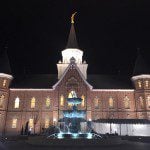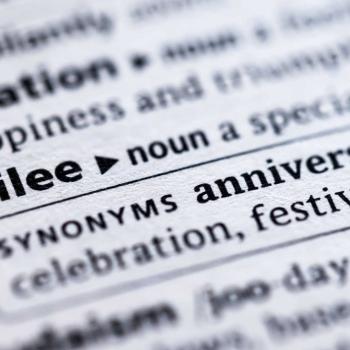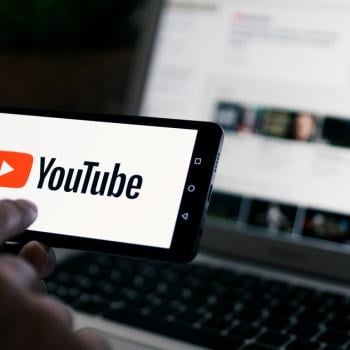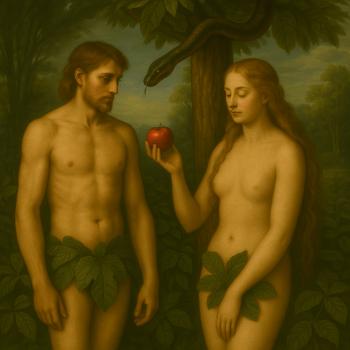Once you start thinking about addiction in terms of bondage to something other than God and conversion as the turning away from it toward God, lots of biblical people come to mind. I thought about the Hebrew prophets with their call to people to turn their back on their present behaviors, to turn back to living as God called them to live, and to turn toward a renewed righteousness in their national identity and practice. I thought of Jesus whose call to people, like those of the prophets in whose tradition he stood, was to repent, to confess their sins, and to live in a community whose moral core was righteousness and love. (Repentance in Greek is metanoia, which means to change one's mind; it is the primary term used for the fundamental act of conversion in the gospels.)
I thought of Simon Peter (Mark 1:16-20), Levi/Matthew (Mark 2:13-17; Matthew 9:9-13), Zacchaeus (Luke 19:10-19), Blind Bartimaeus (Mark 10:46-52), and the women who were "cured of evil spirits and infirmities" and followed Jesus (Luke 8:1-3). I thought about Paul, whose conversion follows a pattern of turning from one way of life, turning to Christ, and subsequent transformation.
I thought about how, in several of Luke's parables (The Prodigal Son: Luke 15:11-32; The Dishonest Steward: Luke 16:1-8a; and The Unjust Judge: Luke 18:2-5), the protagonist comes to a turning point and undergoes a turnaround in his behavior and actions. I thought about how the wise teachers of Israel taught that two paths stretch out before each of us: wisdom and folly. The path of Wisdom is a straight, well-lit path, a life lived respecting and following God by moderate habits, personal integrity, and concern for the good of the community. The path of Folly is a dark, winding, thorn-filled way, a life lived in the undisciplined indulgence of one's appetites without thought of the consequences for anyone beyond oneself. The call of Wisdom is always to leave the path that leads to death (folly) and enter the path that leads to life (wisdom).
With the picture of Bad clean and sober in the movie's final scene before my eyes, I savored these thoughts about the parallels between the freedom from addiction and conversion. There is always the possibility of making better choices with God's help. God's redemptive power offers second chances.
I considered not finishing the novel Crazy Heart since I already knew how it ended. But that seemed unfair to the author, so I read it at night for a few days before going to bed. I've heard that it's good to read uplifting things before going to sleep. I finished it last night, and, as it turned out, that wasn't the best way to end my day. Because the novel, unlike the movie, ends with Bad, having gone through rehab, relapsing and ending up drunk in a ditch. That's the ending Thomas Cobb, the author of the novel Crazy Heart, gave it when it was published over twenty years ago in 1987. It got good reviews, but was pulled out of print after selling 11,000 copies. Cobb, now an English professor at Rhode Island College, wrote the book as his doctoral dissertation.
A friend gave a copy of Crazy Heart to Scott Cooper, an actor and "wannabe" director with a love of country music. He decided to adapt it into a screenplay and then directed the movie.
Here is what Cooper said about the happy ending he gave the movie:
Crazy Heart is about the fact that we all have second chances in life, and regardless of our flaws, because we're all flawed, we can really seek redemption and salvation. Some things are more filmable than others, more palatable than others, and I wanted the story to have a more redemptive ending than the novel.
What didn't come through in the movie is that, apparently, while we can seek redemption and salvation, we can also reject it. Why anyone would is a mystery as inscrutable as that of God's forgiving Grace. But we do. Earlier in the book there's a flashback to Bad hearing hellfire and brimstone sermons in the little country church of his youth. Throughout the book, clues to his sense of guilt and uneasiness with God come through. Right before his relapse into the ditch, his AA counselor Linda tells him, "God didn't make you an alcoholic, you did that yourself. But He can get you free." For reasons we aren't fully told or shown, Bad goes back to the bottle.
Cobb's response to the discrepancy between his novel's ending and the movie's ending is that he loves the movie, loves the response it has gotten, and realized that once he sold the rights, it was out of his hands. "The book and the film are separate works," he said.
The endings certainly are. It's a choice between Redemption and Relapse. It's a choice between a once-for-all, fast and easy conversion (movie) and what may be a once-for-all, fast and final failure (novel).




